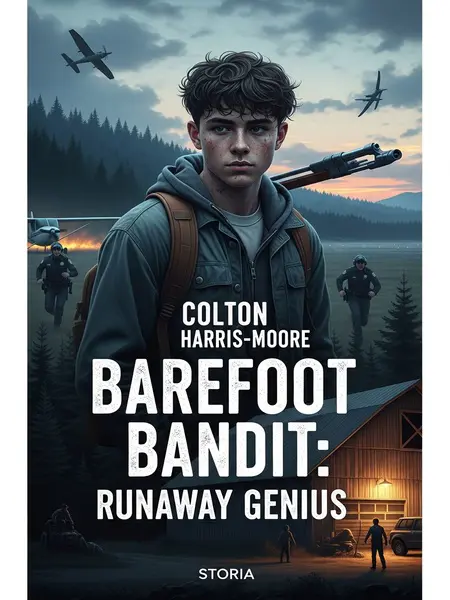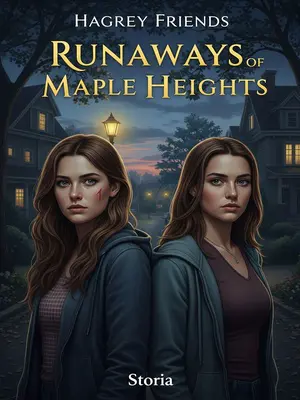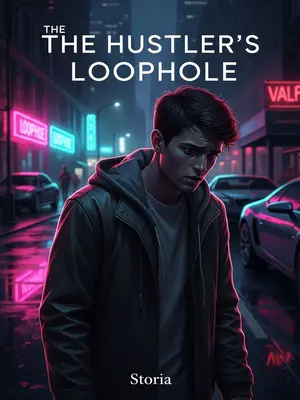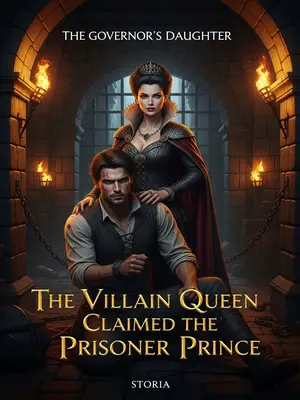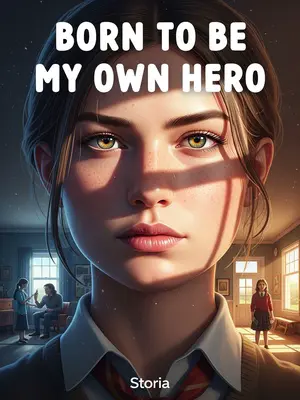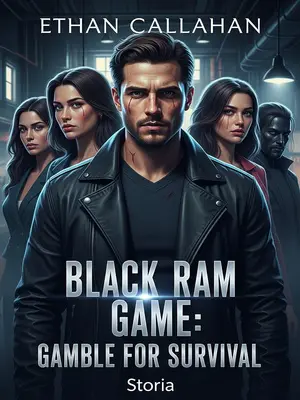Chapter 3: The Legend of the Barefoot Bandit
Little Col was lucky to walk away from that first crash.
He sprawled in the field, staring up at the stars, barely believing he’d survived. His heart thumped like a drum, and for a moment, he felt invincible.
Most folks would’ve gone home and laid low after a scare like that.
They’d quit, maybe even confess. But not Little Col.
Not Little Col.
He brushed dirt off his jeans, dabbed at a bleeding cut, and limped away, already planning his next move.
Hooked on the rush, he pushed his luck further every time.
The thrill was like a drug—every close call made him crave the next one more.
Over the next stretch, he stole two more planes—and crashed two more times.
Each time, he walked away, battered but whole. It was as if luck itself rode shotgun beside him.
Miraculously, every crash destroyed only the plane—he always walked away, shaken but unharmed.
Local newspapers started calling him "the kid with nine lives." Old-timers swapped stories over pancakes at the diner, shaking their heads at his escapes.
He became a legend—a miracle kid in aviation mishaps.
Teens whispered his name in school hallways, adults argued whether he was a genius or a menace. Little Col was everywhere—and nowhere.
Even science shows jumped in, calling his survival unbelievable.
Discovery Channel ran a segment, speculating on how a teenager could survive three plane crashes. The myth grew with every retelling.
While Little Col kept upping the ante, the American police started closing in.
The local sheriff—a burly guy with a handlebar mustache and a thing for black coffee—assembled a task force. They pored over security footage and grilled airport workers.
The airport reported the thefts, and police quickly launched an investigation.
They dusted for prints, followed tire tracks, and even brought in a K-9 unit. The whole town buzzed with rumors and speculation.
Ironically, based on their experience, the police assumed a professional crew was behind the thefts.
They pictured ex-military or Russian mobsters. The truth was so wild, nobody guessed it was just one kid.
Little did they know, Little Col was a solo act.
He watched the news from his hideout, laughing at their wild guesses. It was just him—barefoot, hungry, and always one step ahead.
The case stalled out.
Months passed, and frustration grew. The sheriff lost sleep, chugging diner coffee by the gallon.
Watching from the shadows, Little Col grew annoyed by how clueless the cops were.
He wanted recognition for his stunts. What’s the point of being a legend if nobody knows?
He’d pulled off the impossible—what a waste if no one ever found out.
He scribbled ideas in his notebook, plotting ways to make his mark.
How could he brag about it?
He daydreamed about anonymous letters, prank calls to radio shows, or graffiti tags on the wreckage.
So, he decided to up his game.
He started leaving clues—footprints, messages, anything to taunt the cops.
He wanted to follow in the footsteps of infamous outlaws, build his own style, and become a legend.
He devoured books about Billy the Kid, D.B. Cooper, Bonnie and Clyde—he wanted his name in the same breath.
Little Col had a million ideas.
He brainstormed new ways to outfox the police, sketching wild escape routes and daring heists.
Soon, he was flying stolen planes across the country, robbing homes, supermarkets, ATMs, luxury cars—nothing was off limits.
He became a phantom, popping up everywhere, impossible to pin down.
After each job, Little Col would chalk a bare footprint and leave a taunting note:
“cya (see you)”
He scrawled it on ATM screens, mirrors, and walls. It was his signature—his way of saying, "Catch me if you can."
Translation: Think you can catch me? Bring it!
The message went viral. Kids copied it at school, parents groaned, and cops fumed.
From 2008 to 2010, Little Col’s crimes spanned nine states, with over 100 successful thefts.
The FBI started a special database just for him. Each new entry was another blow to their pride.
The sheer scope of his crimes made him infamous in American crime history.
Reporters camped outside his old house, hoping for a scoop. Late-night hosts joked about him, and YouTube memes exploded.
Just as he hoped, his antics drove law enforcement crazy.
The sheriff swore, "I’ll catch him if it’s the last thing I do." The FBI rolled up in black SUVs, determined to end his reign.
By reviewing surveillance footage, police finally identified Little Col.
They matched his face to old mugshots, piecing together his movements like a jigsaw puzzle.
They found the wreckage of his first stolen plane and pulled his DNA from vomit left in the cockpit.
It was a breakthrough—front-page news: "Barefoot Bandit’s DNA Found at Scene!"
With the truth exposed, police felt humiliated—
The sheriff dodged interviews, and the FBI quietly reassigned agents. Nobody wanted to admit a teenager had run circles around them.
All these crimes had been pulled off by a teenager.
Parents warned their kids, "Don’t get any ideas." Teachers used his story as a cautionary tale in class.
Because the offenses crossed state lines and were so serious, the FBI joined the hunt.
They brought in specialists, set up hotlines, and coordinated with police from coast to coast.
But the FBI’s involvement only made things crazier—they spent months staking out locations, planned for half a year, and still never caught a glimpse of Little Col.
He moved like a ghost, always one step ahead. Agents grew desperate, their reports filled with dead ends.
You might wonder: How did Little Col dodge the FBI for so long?
He had a sixth sense for trouble, vanishing just before a raid or checkpoint. It was almost supernatural.
The secret was twofold:
First, he hid out in the forests, appearing and vanishing like a shadow.
He built shelters from branches, foraged for berries, and lived off stolen supplies. The woods were his kingdom.
Second, he constantly changed locations, often traveling by plane.
He’d land in remote fields, hitch rides, and vanish before anyone realized he was there. Sometimes, he’d walk barefoot for miles to avoid leaving tracks.
And this guerrilla style was something American law enforcement just couldn’t handle.
They weren’t trained for cat-and-mouse games in the wild. Helicopters and drones couldn’t keep up with a kid who knew every trail and backroad.
As his story spread, people across America were stunned.
He became a folk hero in some circles—an outlaw with a cause. Social media exploded with fan art and wild theories.
With nowhere else to turn, the FBI posted a $10,000 reward for his capture.
Wanted posters popped up in post offices and convenience stores. Radio hosts joked about splitting the bounty.
For a while, Little Col was everywhere—on TV, online, even on T-shirts at the local bar.
People gave him a new nickname:
The Barefoot Bandit.
The name stuck. Kids chalked it on sidewalks, and bars started Barefoot Bandit drink specials.
Entrepreneurs cashed in, selling homemade Barefoot Bandit gear online—hoodies, mugs, even bumper stickers.
Fans sent him letters in jail, hoping for a reply.
As the heat turned up and his fame grew, Little Col went further underground.
He switched up his look—dyed his hair, grew scruff, wore shades at night. He became a master of disguise.
He started an Instagram account, posting selfies and updates from the road.
He snapped pics of muddy feet, wrecked planes, and handwritten notes. The account blew up overnight.
Within days, he had ten thousand followers.
Teenagers cheered him on in comments, journalists slid into his DMs for interviews.
The mockery hit its peak.
Memes flooded Twitter and Reddit. The FBI became the punchline for every late-night joke.
Fed up, the FBI teamed up with police from nine states and Homeland Security for a massive crackdown.
They set up roadblocks, swept the forests, and watched every airport in the region.
They promised the public they’d catch Little Col in days.
Press conferences featured grim-faced agents vowing justice. The countdown was on.
But Little Col had one last wild trick up his sleeve, ready to drive law enforcement crazy.
He planned his boldest escape yet—a finale nobody would ever forget.
